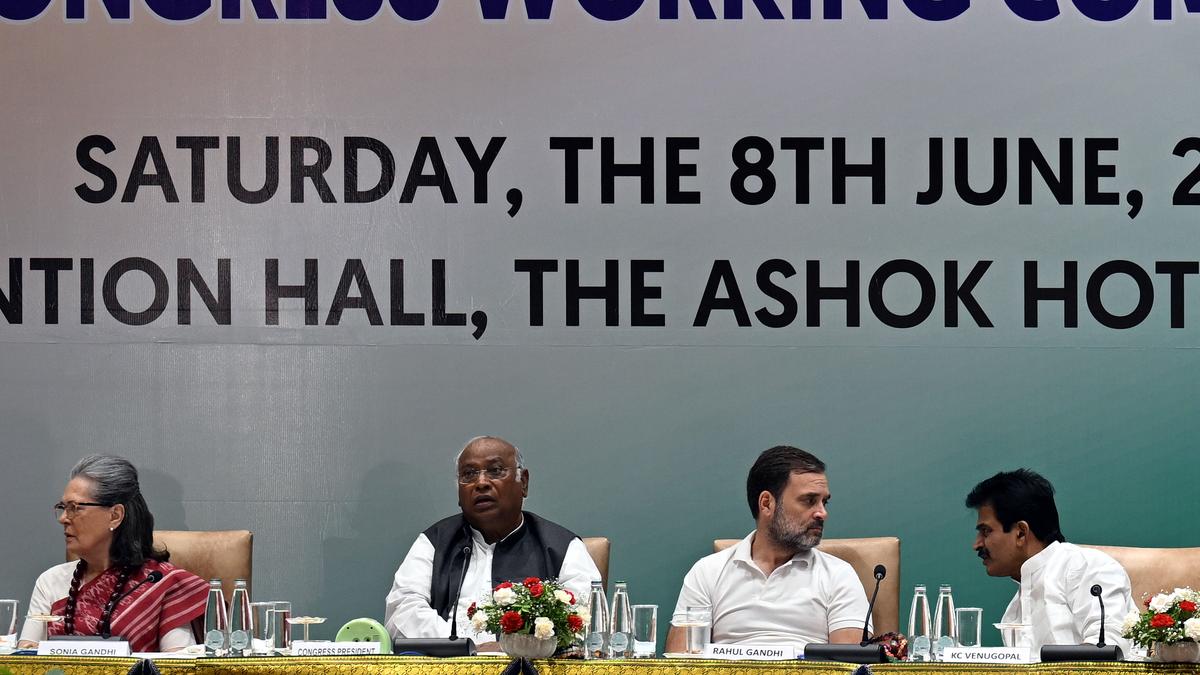
Congress Working Committee asks Rahul Gandhi to accept Leader of Opposition post in Lok Sabha
The Hindu
Congress Working Committee resolves to ask Rahul Gandhi to become Leader of the Opposition, says Bharat Jodo and Bharat Jodo Nyay yatras were turning points
The Congress Working Committee unanimously adopted a resolution on Saturday asking Rahul Gandhi to become the Leader of the Opposition (LoP) in the 18th Lok Sabha.
Taking note of the sentiments expressed at the party’s highest decision-making body, Mr. Gandhi said he will think it over and decide “very soon”. Party president Mallikarjun Kharge urged him to “abide” by the CWC’s formal resolution and take up the responsibility.
The Congress Parliamentary Party (CPP) comprising the newly-elected Lok Sabha members and Rajya Sabha members also met later at the historic Central Hall of Samvidhan Sadan (Old Parliament) and re-elected Sonia Gandhi as the chairperson after her name was proposed by Mr. Kharge.
The CWC praised the party’s Lok Sabha performance under adverse conditions, but the party decided to set up separate committees in States, including party-ruled Himachal Pradesh, Karnataka and Telangana, to find out why the performance was below expectations and what could be done to correct the situation.
In his opening remarks at the CWC, Mr. Kharge asserted that the 2024 Lok Sabha election verdict is a “decisive rejection of the politics of divisiveness and hate of the BJP of the past 10 years” and stressed that the INDIA bloc must continue to function cohesively both inside and outside Parliament.
Echoing him, Ms. Gandhi told the Congress MPs that she did not expect to see any change in Prime Minister Narendra Modi’s “substance and style of his governance”. “That is why, as members of the CPP, we have a special obligation to be watchful, vigilant and proactive in holding him and his new NDA government accountable,” she said.
The main resolution of the CWC congratulated the people for “voting so powerfully to preserve democracy, protect the Constitution and enhance social and economic justice”.

“Writing, in general, is a very solitary process,” says Yauvanika Chopra, Associate Director at The New India Foundation (NIF), which, earlier this year, announced the 12th edition of its NIF Book Fellowships for research and scholarship about Indian history after Independence. While authors, in general, are built for it, it can still get very lonely, says Chopra, pointing out that the fellowship’s community support is as valuable as the monetary benefits it offers. “There is a solid community of NIF fellows, trustees, language experts, jury members, all of whom are incredibly competent,” she says. “They really help make authors feel supported from manuscript to publication, so you never feel like you’re struggling through isolation.”

Several principals of government and private schools in Delhi on Tuesday said the Directorate of Education (DoE) circular from a day earlier, directing schools to conduct classes in ‘hybrid’ mode, had caused confusion regarding day-to-day operations as they did not know how many students would return to school from Wednesday and how would teachers instruct in two modes — online and in person — at once. The DoE circular on Monday had also stated that the option to “exercise online mode of education, wherever available, shall vest with the students and their guardians”. Several schoolteachers also expressed confusion regarding the DoE order. A government schoolteacher said he was unsure of how to cope with the resumption of physical classes, given that the order directing government offices to ensure that 50% of the employees work from home is still in place. On Monday, the Commission for Air Quality Management in the National Capital Region and Adjoining Areas (CAQM) had, on the orders of the Supreme Court, directed schools in Delhi-NCR to shift classes to the hybrid mode, following which the DoE had issued the circular. The court had urged the Centre’s pollution watchdog to consider restarting physical classes due to many students missing out on the mid-day meals and lacking the necessary means to attend classes online. The CAQM had, on November 20, asked schools in Delhi-NCR to shift to the online mode of teaching.









